
Questa seconda parte è l'approfondimento dell'uso del complemento verbale di grado 得.
Nella prima parte abbiamo visto tre frasi che avevano in comune, tra l'altro, l'avere un predicato che non richiedeva necessariamente un complemento d'oggetto.
Le frasi
 "La suaspiegazione è complicata.",
"La suaspiegazione è complicata.",
"Lui parla chiaramente."
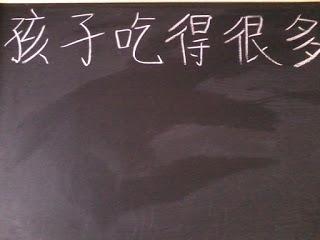
e “Il bambino ha mangiato tanto.” avevano un predicato ma non il complemento d'oggetto.
Vediamo cosa succede quando aggiungiamo il complemento d'oggetto.
Le frasi diventeranno: " La sua spiegazione della grammatica è complicata.", "Lui parla cinese in maniera chiara." e infine "Il bambino ha mangiato (del cibo) tanto."Quest'ultima frase mette in evidenza l'uso (non infrequente nella lingua cinese) di espressioni dove il predicato contiene il verbo e il nome (mangiare=mangiare il cibo, ballare=saltare il ballo, cantare=cantare un canto etc).
Dato che il complemento di grado si riferisce al verbo dobbiamo trovare una soluzione al problema del verbo con doppio complemento: quello di grado e quello d'oggetto.
La soluzione squisitamente cinese del problema è assai semplice:
antepongo il complemento d'oggetto a mo' di "parliamo di..." cui segue la frase con il complemento di grado come abbiamo visto nella prima parte.
Facendo così posso cambiare la prima frase da "Lui spiega la grammatica in maniera complicata" in:
 "La grammatica lui (la) spiega in maniera complicata."
"La grammatica lui (la) spiega in maniera complicata."Oppure la frase "Lui parla cinese in maniera chiara" in:

"Il cinese lui (la) parla in maniera chiara"
e la frase "Il bambino ha mangiato tanto cibo" in:

"Del cibo il bambino (ne) ha mangiato tanto."La stessa frase la possiamo comporre anteponendo il soggetto a questo complemento d'oggetto.
Avremo così:
 "Lui la grammatica (la) spiega in maniera complicata"
"Lui la grammatica (la) spiega in maniera complicata"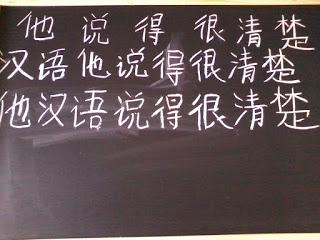
"Lui il cinese (lo) parla in maniera chiara."
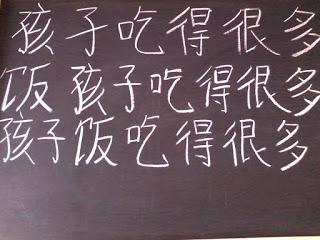
"Il bambino del cibo (ne) ha mangiato tanto."
Infine, in certe occasioni, possiamo esprimere una frase usando il predicato e il suo complemento d'oggetto e, per specificarne il grado, ripetere il verbo aggiungendone il grado. E' una maniera un po' ridondante che usiamo assai di rado.
Avremmo in tal caso:
 "Lui spiega la grammatica (e la) spiega in maniera complicata."
"Lui spiega la grammatica (e la) spiega in maniera complicata."  "Lui parla cinese parlando(la) in maniera chiara."
"Lui parla cinese parlando(la) in maniera chiara."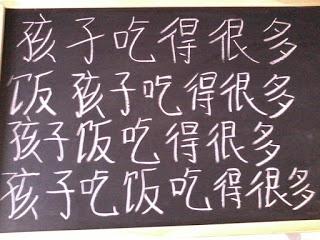
"Il bambino ha mangiato il cibo mangiando(ne) tanto."
Sulla falsariga di quanto sopra possiamo estenderne l'uso a scopi svariati.
"Il maestro ha insegnato la scrittura (così bene che da allora) continuo a scrivere correttamente."

IL MAESTRO --- INSEGNA --- SCRITTURA --- INSEGNA --- 得 --- IO CONTINUO A SCRIVERE CORRETTAMENTE
Nel romanzo di Xu Kun "Buongiorno Pechino" si trova la frase "Il sole (del primo mattino)...illuminava talmente che la gente non riusciva a tener gli occhi aperti."
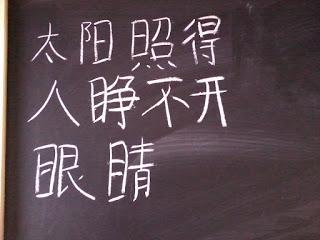
IL SOLE --- ILLUMINAVA --- 得 --- LA GENTE NON RIUSCIVA A TENER GLI OCCHI APERTI
Fino ad avere espressioni che nella lingua italiana non hanno nessuna corrispondenza, come nella frase "La figlia è brutta." che si trasforma in:

LA FIGLIA --- CRESCIUTA --- 得 --- BRUTTA
*******************************************************
This second part is the deepening of the use of verbal complement grade 得.
In the first part we have seen three sentences that had in common, besides, that the predicate did not require necessarily a complement of object.The phrases "His explanation is complicated." "He speaks clearly." and "The child has eaten so much." had a predicate but not the complement of the subject.
Let's see what happens when we the verb takes an object.The sentences will become: "His explanation of the grammar is complicated." "He speaks Chinese clearly." and finally, "The boy has eaten (food) much." This last sentence highlights the use of expressions (not uncommon in Chinese) where the predicate contains the verb and the name (eat = eat the food, dance = skip the dance, sing = sing a song etc).
Since the complement of degree refers to the verb we have to find a solution to the problem of the double complement of the verb: complement of degree and that of the object.The solution of the problem is simple (very Chinese):Put at the beginning of the sentence the object as "we speak of ..." followed by the phrase with the complement of degree as we saw in the first part.Doing so can change the first sentence from "He explains grammar in a complicated way" into: "The grammar he explains in a complicated way.", "Or the phrase" He speaks Chinese clearly "in" The Chinese he speaks in a clearly." and "Thi child eat so much food" into "Of the food the child ate so much."
The same sentence we can express putting the subject before the object.We will then have: "He, as per the grammar, explains (it) in a complicated way", "He, as per Chinese, speaks (it) clearly." and "The baby, as per the food, ate so much."
Finally, on some occasions, we can have as first part of the sentence a predicate and its complement of object than, in order to specify the verb's grade, the repetition of the verb by adding the grade. It's somehow redundant and we use it rarely.In that cases we would have: "He explains grammar (and) explains (it) in a complicated way." "He speaks Chinese (by) speaking clearly." and "The child has eaten the food (and) eat so much."
Along the lines of the above we can extend its use in various purposes.
"The teacher taught writing (so well that since then) I continue to write correctly."THE TEACHER --- TEACHES --- WRITING --- TEACHES --- 得 --- I CONTINUED TO WRITE PROPERLY
In a novel of Xu Kun "Hello Beijing" there's a phrase "The sun (early in the morning) lit up so that people could not keep eyes open."THE SUN --- SHONE --- 得 --- PEOPLE COULD NOT KEEP EYES OPEN
Last but not lease we have this expression that in the Italian language does not have any matches: "The daughter is ugly." which turns into:DAUGHTER --- GROWN --- 得 ---- UGLY
